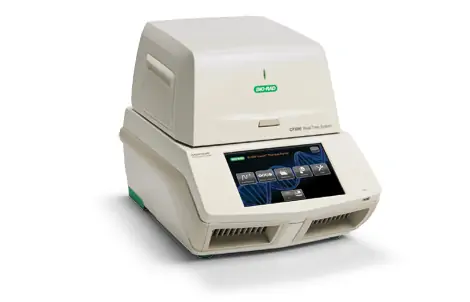Лаборатория протеомного анализа
Публикаций
24
Цитирований
487
Индекс Хирша
10
Необходимо авторизоваться.
Исследование взаимодействия бактериальных и эукариотических клеток («патоген-хозяин») для поиска и уточнения фундаментальных механизмов патогенеза мультифакторных заболеваний.
- Next Generation Sequencing (NGS)
- MALDI масс-спектроскопия
- ПЦР в реальном времени и цифровая ПЦР, включая дизайн и валидацию праймеров и зондов к Вашей мишени
- Клонирование
- Работа с бактериальными штаммами
- Oxford Nanopore Technologies
- Секвенирование по Сенгеру
- Гель-электрофорез
- Масс-спектрометрия
Мария Галямина
Младший научный сотрудник

Мария Михайлычева
Лаборант-исследователь
Николай Силаков
Лаборант-исследователь
Андрей Семёнов
Лаборант-исследователь

Наталия Борзенко
Лаборант-исследователь
Направления исследований
Изучение молекулярных механизмов долговременной эпигенетической памяти у адгезивно-инвазивной формы кишечной палочки (AIEC)
+

Данное исследование направлено на изучение молекулярных механизмов эпигенетической памяти у адгезивно-инвазивной формы Escherichia coli (AIEC). Эпигенетическая память определяется как способность организма регистрировать предыдущие события на уровне экспрессии генов без изменения последовательности ДНК. Данное явление играет существенную роль в прогрессии множества заболеваний, включая воспалительные заболевания кишечника. Адгезивно-инвазивная форма Escherichia coli (AIEC) представляет собой бактерию, значительно представленную у пациентов, страдающих болезнью Крона. Данный микроорганизм обладает способностью проникать в клетки кишечника и инициировать воспалительный процесс. В контексте проводимого исследования, ученые стремятся выяснить, каким образом AIEC "регистрирует" предыдущие взаимодействия с иммунной системой хозяина и средой кишечника, и как это влияет на ее способность инициировать воспаление. Это может включать анализ различных молекулярных механизмов, таких как модификации ДНК, изменения в структуре хроматина и регуляция генной экспрессии. Осознание этих механизмов может способствовать разработке новых стратегий лечения воспалительных заболеваний кишечника, таких как болезнь Крона. Это может предполагать создание препаратов, воздействующих на эпигенетическую память AIEC, или стратегий, способствующих повышению эффективности иммунной системы в борьбе с данной бактерией.
Публикации и патенты
Найдено
Ничего не найдено, попробуйте изменить настройки фильтра.
Адрес лаборатории
Москва, Малая Пироговская ул., 1, стр. 3
Необходимо авторизоваться.





















